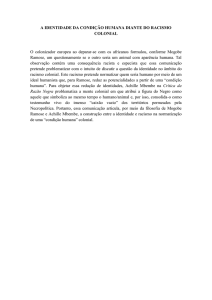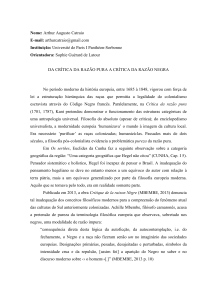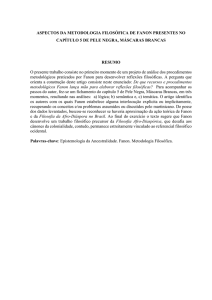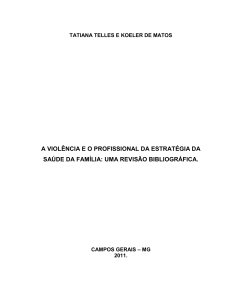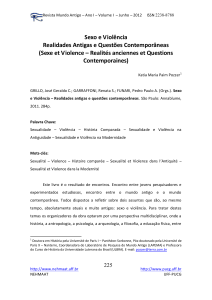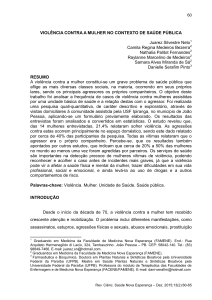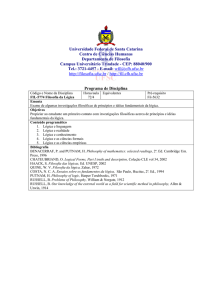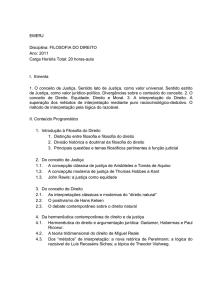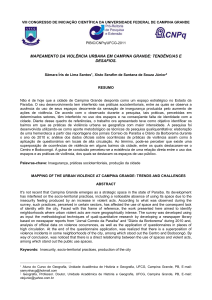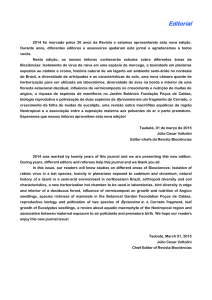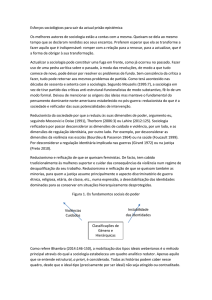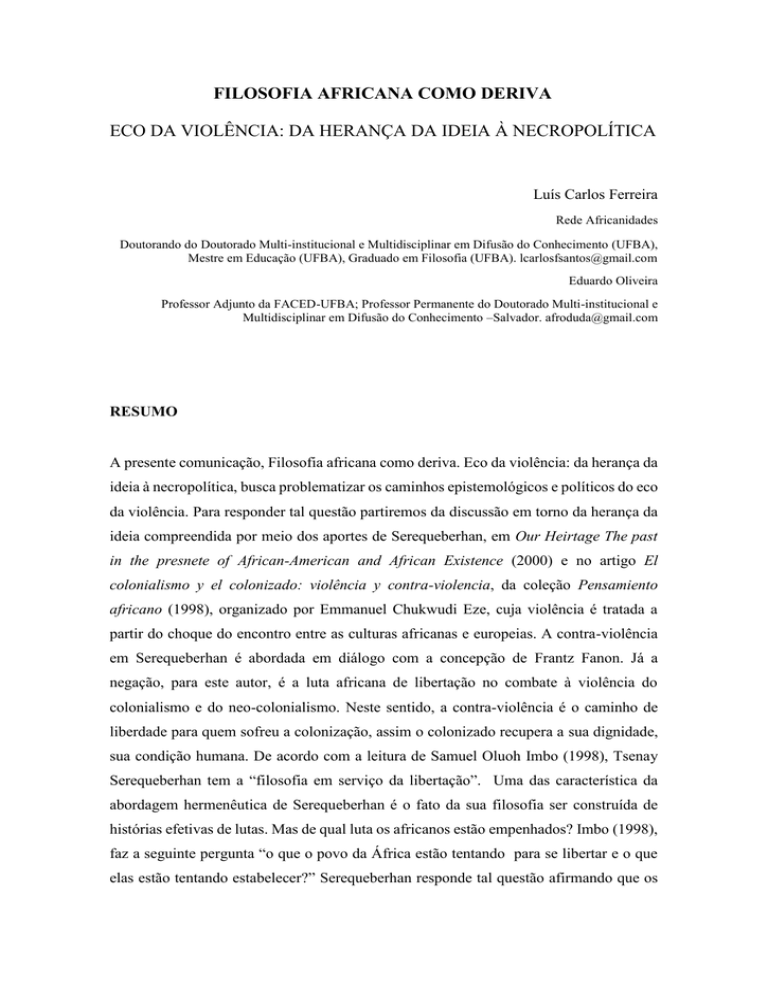
FILOSOFIA AFRICANA COMO DERIVA
ECO DA VIOLÊNCIA: DA HERANÇA DA IDEIA À NECROPOLÍTICA
Luís Carlos Ferreira
Rede Africanidades
Doutorando do Doutorado Multi-institucional e Multidisciplinar em Difusão do Conhecimento (UFBA),
Mestre em Educação (UFBA), Graduado em Filosofia (UFBA). [email protected]
Eduardo Oliveira
Professor Adjunto da FACED-UFBA; Professor Permanente do Doutorado Multi-institucional e
Multidisciplinar em Difusão do Conhecimento –Salvador. [email protected]
RESUMO
A presente comunicação, Filosofia africana como deriva. Eco da violência: da herança da
ideia à necropolítica, busca problematizar os caminhos epistemológicos e políticos do eco
da violência. Para responder tal questão partiremos da discussão em torno da herança da
ideia compreendida por meio dos aportes de Serequeberhan, em Our Heirtage The past
in the presnete of African-American and African Existence (2000) e no artigo El
colonialismo y el colonizado: violência y contra-violencia, da coleção Pensamiento
africano (1998), organizado por Emmanuel Chukwudi Eze, cuja violência é tratada a
partir do choque do encontro entre as culturas africanas e europeias. A contra-violência
em Serequeberhan é abordada em diálogo com a concepção de Frantz Fanon. Já a
negação, para este autor, é a luta africana de libertação no combate à violência do
colonialismo e do neo-colonialismo. Neste sentido, a contra-violência é o caminho de
liberdade para quem sofreu a colonização, assim o colonizado recupera a sua dignidade,
sua condição humana. De acordo com a leitura de Samuel Oluoh Imbo (1998), Tsenay
Serequeberhan tem a “filosofia em serviço da libertação”. Uma das característica da
abordagem hermenêutica de Serequeberhan é o fato da sua filosofia ser construída de
histórias efetivas de lutas. Mas de qual luta os africanos estão empenhados? Imbo (1998),
faz a seguinte pergunta “o que o povo da África estão tentando para se libertar e o que
elas estão tentando estabelecer?” Serequeberhan responde tal questão afirmando que os
africnaos estão buscando se libertar das categorias europeias, o eco da herança da ideia.
E estão tentando estabelecer uma historicidade própria e uma prática filosófica. Um outro
eco da violência é a questão da necropolítica, esta é uma discussão presente nos trabalhos
do filósofo Achille Mbembe. Os trabalhos de Mbembe apontados nesta comunicação são
os livros: Crítica da razão negra (2014), Sair da grande noite: ensaio sobre a África
descolonizada (2014) e África Insubmissa: cristianismo, poder e Estado na sociedade
pós-colonial (2013) e o artigo Necropolítica (2006). Mbembe (2006) no artigo intitulado
Necropolítica constrói sua argumentação em diálogo com as leituras dos conceitos de
“vida nua” de Giorgio Agamben, biopolítica de Michel Foucault e traz forte influência
das argumentações de Frantz Fanon. O filósofo francês, Foucault, entendia por biopoder
o domínio da vida sobre o que o poder tem estabelecido seu controle. O ponto em questão
é saber quais são as condições reais para se exercer o poder de matar, de deixar viver ou
de expor a morte? “É a partir deste conflito entre o poder de matar e a recusa em morrer
que se determinam as práticas e as representações”, (MBEMBE, A, 2013, p.54), de acordo
com Mbembe assim se explicita a necropolítica, como uma política de morte. Atrelada a
esta discussão tem a questão da raça, o autor discute a raça como enquadramento da
produção do alterocídio. O racismo é um ponto central para a fabricação da morte do
outro (negro). O outro é entendido como ameaça, segundo Mbembe: “constituindo o
Outro não como semelhante a si mesmo, mas como objeto intrinsecamente ameaçado, do
qual é preciso proteger-se, desfazer-se, ou que, simplesmente, é preciso destruir, devido
a não conseguir assegurar o seu controle total”. (MBEMBE, 2014, p. 26). Para o autor a
raça (ou racismo) é um elemento entendido como uma “efabulação e enclausuramento do
espírito”. Nesse aspecto somente é possível falar da raça (ou do racismo) em uma
linguagem desadequada, seria o que o autor chama de uma forma de representação
primária. A raça é produtora de simulacros de superfície. Uma outra característica é a
possibilidade desta categoria analítica ser geradora de medos, “de problemas do
pensamento de terror, mas sobretudo de infinitos sofrimentos e, eventualmente, de
catástrofes” (MBEMBE, 2014, p. 25). Mbembe em diálogo com Frantz Fanon, entende a
raça também como o nome que deve dar-se ao ressentimento amargo, ao irrepreensível
desejo de vingança. Isto é, a raiva daqueles que lutaram contra a sujeição e foram, não
raramente, obrigados a sofrer um sem-fim de injúrias, todos os tipos de violações e de
humilhações e inúmeras ofensas. O eco da violência, epistemológica- Herança da Ideiae política- Necropolítica-, tem sua construção organizada tanto em Serequeberhan quanto
em Mbembe, em diálogo intenso com Fanon. A presença de Fanon é muito forte nesses
dois autores citados, entretanto, trazemos para responder à questão problema: se a
violência traduzida pela herança da Ideia e materializada pela necropolítica é a negação
da razão? Em diálogo com Édouard Glissant, na defesa de uma filosofia africana como
deriva. A filosofia africana contemporânea nos mostra que a “a violência moderna,
nascida do choque de culturas, é de um outro tipo. Alimenta-se do seu impacto e exasperase com o seu próprio eco” (GLISSANT, 2011, p. 187). O eco da violência moderna se faz
presente nas violências cotidianas nas quais agem subterrâneas nos guetos, subúrbios,
periferias. São lugares que a violência é exercida no seu sentido total, “na selva das
cidades. Contudo, violência da miséria não é uma vocação”. (GLISSANT, 2011, p.187).
PALAVRA CHAVE: FILOSOFIA AFRICANA, NECROPOLÍTICA, HERANÇA DA
IDEIA, DERIVA.
ABSTRACT
The present communication, African Philosophy as derived. Echoes of violence: from the
inheritance of the idea to the necropolitics, seeks to problematize the epistemological and
political ways of the echo of violence. In order to answer this question we will start from
the discussion about the inheritance of the idea is understood through the contributions of
Serequeberhan, in Our Heirtage The past in the presence of African-American and African
Existence (2000) and in the article Colonialism and colonized: violence And antiviolence, from the collection Pensamiento Africano (1998), organized by Emmanuel
Chukwudi Eze, whose violence is treated as a result of the clash between African and
European cultures. The counter-violence in Serequeberhan is approached in dialogue with
Frantz Fanon's conception. The denial, for this author, is the African struggle for
liberation in the struggle against the violence of colonialism and neo-colonialism. In this
sense, counter-violence is the path of freedom for those who suffered colonization, so the
colonized regains their dignity, their human condition. According to the reading of
Samuel Oluoh Imbo (1998), Tsenay Serequeberhan has the "philosophy in service of
liberation". One of the hallmarks of Serequeberhan's hermeneutic approach is the fact that
his philosophy is built on effective battle stories. But what struggle are Africans engaged
in? Imbo (1998) asks the question "what are the people of Africa trying to liberate
themselves and what are they trying to establish?" Serequeberhan answers this question
by saying that Africans are seeking to break free from European categories, the echo of
heritage Of the idea. And they are trying to establish their own historicity and
philosophical practice. Another echo of violence is the question of necropolitics, this is a
discussion present in the works of the philosopher Achille Mbembe. The work of
Mbembe pointed out in this communication is the books: Critique of Black Reason
(2014), Exit the Great Night: Essay on Decolonized Africa (2014) and Africa Insubmissa:
Christianity, Power and State in Postcolonial Society (2013) and Necropolititics Article
(2006). Mbembe (2006) in the article entitled Necropolitics constructs his argument in
dialogue with the readings of the concepts of "naked life" of Giorgio Agamben,
"biopolitics" of Michel Foucault and brings strong influence of the arguments of Frantz
Fanon. The French philosopher, Foucault, understood by biopower the domain of life
over which power has established its control. The point in question is to know what are
the real conditions for exercising the power to kill, to let live or to expose death? "It is
from this conflict between the power to kill and the refusal to die that the practices and
the representations are determined" (MBEMBE, A, 2013, p.54), according to Mbembe,
thus making necropolitics explicit, as a Policy of death. To the question of race, the author
discusses race as the framework for the production of alterocide, racism is a central point
for the fabrication of the death of the other (black). The other is understood as a threat,
according to Mbembe: "by constituting the Other not as similar to itself, but as an
intrinsically threatened object, from which one must protect oneself, one must dispose of
oneself, or one simply has to destroy, Unable to ensure full control. " (MBEMBE, 2014,
p.26). Race (or racism) is an element which the author understands as a "collaborative
and spiritual enclosure". In this respect it is only possible to speak of race (or racism) in
an inadequate language, which is what the author calls a form of primary representation.
The race is a producer of surface drills. Another characteristic is the possibility of this
analytical category to generate fears, "from problems of the thought of terror, but
especially of infinite suffering and eventually catastrophes" (MBEMBE, 2014, p.25).
Mbembe in dialogue with Frantz Fanon, understands race also as the name that should be
given to bitter resentment, the blameless desire for revenge, that is, the anger of those
who fought against subjection and were, not infrequently, forced to suffer a Endless
insults, all kinds of rape and humiliation, and countless offenses. The echo of violence,
epistemological - Inheritance of Idea - and politics - Necropolitics -, has its construction
organized in both Serequeberhan and Mbembe in intense dialogue with Fanon. The
presence of Fanon is very strong in these two authors cited, however, we bring to answer
the problem issue of violence translated by the heritage of the Idea and materialized by
the necropolitics is the negation of reason? Dialogue with Édouard Glissant, in defense
of an African philosophy as it derives. Contemporary African philosophy shows us that
"modern violence, born of the Clash of cultures, is of another type. It feeds on its impact
and is exasperated with its own echo "(GLISSANT, 2011, 187). The echo of modern
violence is present in the daily violence in which they act underground in the ghettos,
suburbs, peripheries. They are places where violence is exercised in its total sense, "in the
jungle of cities. However, violence of misery is not a vocation." (GLISSANT, 2011,
p.187).
KEY WORD: AFRICAN PHILOSOPHY, NECROPOLITICS, IDEAN HERITAGE,
DERIVA.

